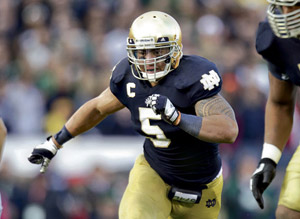The One stop to find out about Polynesians in sports at the amateur, high school, collegiate and professional levels and much more.
Sunday, November 11, 2012
Te’o A Role Model Worth Watching
By Steve Murray on Nov 06, 2012 in Hot Air, Sports
Manti Te’o has Notre Dame thinking national championship. AP photo
Since 1964, The Word of Life Mural, better known as Touchdown Jesus, has watched over the South Bend campus of Notre Dame University and the world’s third-greatest symbol of Catholicism, Notre Dame Stadium. In the mosaic’s shadow have paraded countless false idols from the Four Horseman to Lou Holtz, but after decades of glory, God and unquestioned marketing genius, the Fighting Irish have a figure truly worthy of special admiration. Not idolization. That wouldn’t be appropriate.
Manti Te’o is not the best linebacker to ever play college football, nor is he the most talented to ever don the golden helmet. He’s not even the best defender in the last handful of seasons – that would be former Nebraska defensive lineman Ndamukong Suh – nor is he a serious Heisman Trophy candidate, as voters have been programmed to look nowhere but at two offensive positions. But he is an inspiration, more off the field than on, and that’s saying something.
Te’o is a great football player and will be a blessing to whatever team and community he next calls home.
(Sudden sidebar rant: As of this writing, the Lions are 2-4, the Tigers are down 0-2 in the World Series, the Pistons stink and who knows when the Red Wings will get back on the ice? It may still be halftime in America, but it’s still gloomy in the Motor City and a stud linebacker with a deep concern for those less fortunate is sorely needed in an area big on dreams but low on hope. It’s time to be Terrible for Te’o. Self-serving rant concluded.)
It’s his athletic skills that will determine his future financial security, but it is the second part of the pre-rant sentence that makes Te’o sadly more unique.
No, he isn’t the only athlete doing good in his community, but in a nation centered on self-interest his successful efforts to be more than just a great football player are noteworthy. No more so than when he reached out to a family on the very day their 12-year-old daughter, who was a huge Notre Dame fan, died of leukemia.
The emailed letter was a private two-page note to a family he never met. It may have remained a secret if not for a family friend who tipped off Fox Sports columnist Greg Couch, who had earlier written an article about the linebacker’s worthiness of the Heisman. As it was, the family only allowed a small portion of the letter to be published, and Te’o isn’t talking about it except to say he’s just following the examples set down by his parents, Brian and Ottilia.
But that, and his religious faith, are all you need to know.
Te’o has succeeded as a person not because of ancient spiritual teachings nor tough parental love, but because of a moral foundation not based on self.
I’m not suggesting that the betterment of society is found in the dogma of Christianity. I have perhaps too healthy a fear of organized religion, political parties or any organization that tries to control thought or moral behavior with a singular world view. But one can’t deny that his upbringing, both in the Mormon church and out, has shaped Te’o into the person he is.
Psychologist Lawrence Kohlberg’s seminal work on moral development, while not without its critics, divides moral growth into six stages. The most developed stage, universal ethical principles, says that people at this level believe moral reasoning is based on universal ethical principles, and that a person should act in a moral way because it is right, not because of any legal requirement or popular opinion. It’s definitely not based on self-interest, which Kohlberg puts at stage two, or at the moral level of a child.
As a devout Mormon, Te’o was expected to go to BYU. When he decided not to, many took it as an offense to the church. As Te’o said in a March 2009 MidWeek cover story, “Everybody wanted me to go somewhere. I was being pulled in all directions and I just relied on my parents, the Lord and the Heavenly Father to direct me.”
It’s what Kohlberg means about moral acts not being judged by social contracts. It’s also what makes him unique among the many who believe that with great power comes great opportunity for self-reward.
Subscribe to:
Post Comments (Atom)

No comments:
Post a Comment